According to Notice of the Shaanxi Provincial Department of Education on the Announcement of the List of Excellent Scientific and Technological Research Achievements of Shaanxi Colleges and Universities in 2024, the research achievement Molecular Basis of Living Nutrient Parasitism and Infection Pathogenicity of Puccinia striiformis f. sp. Tritici which was hosted by Prof. Wang Xiaojie from our college has been awarded for Special Prize as an Outstanding Achievement in Science and Technology Research of Shaanxi Colleges and Universities in 2024.
Stripe rust is a significant biological disaster that threatens the safety of wheat production, resulting in a yield reduction of 10% to 30% in typical years and causing complete crop failure when susceptible varieties are planted. Puccinia striiformis f. sp. tritici is a living nutrient parasitic fungus that relies on living wheat for survival. Based on the parasitic characteristics of the pathogen, we are exploring whether we can block the pathogen's manipulation of the host, prevent it from obtaining nutrients from the host, "starving pathogen", and prevent its survival, ultimately aiming to create broadly resistant materials. The research team aim to explore the creation of broadly resistant materials from the perspective of plant protection, overcoming the challenge of frequent disease outbreaks caused by the easy loss of resistance mediated by resistance genes. The key lies in identifying the crucial pathogenic factors of the pathogen.

This research has taken the lead in high-quality assembly of the Puccinia striiformis f. sp. tritici genome, revealing the omics characteristics of its living nutrient parasitism and pathogenicity, and establishing a technical system for studying rust gene functions, which has promoted the biological research of living nutrient parasitic fungi. It has systematically identified the effector proteome of Puccinia striiformis f. sp. tritici, deeply revealed the pathogenic mechanism of key effector proteins manipulating host immunity and the strategy of living parasitism, and discovered for the first time that Puccinia striiformis f. sp. tritici sRNA cross-regulates host immunity, broadening our understanding of rust effectors' biology and their regulation of host immunity. It has also clarified for the first time that sugar is an essential nutrient obtained by Puccinia striiformis f. sp. tritici from the host, revealing the pathway in which Puccinia striiformis f. sp. tritici manipulates host sugar transport to promote sugar absorption, providing ideas for creating resistant materials by limiting sugar absorption to starve the pathogen. Based on the excavated key genes related to pathogen nutrient absorption and pathogenicity, improved strategies have been designed to create broadly resistant materials, providing new ideas and resources for wheat rust resistance germplasm innovation.